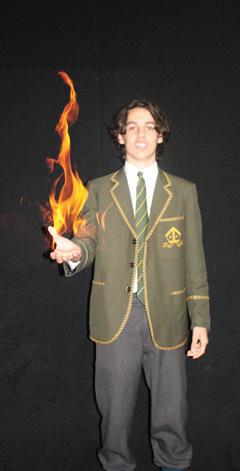Aden Wilmshurst , Year 9
Why wa s S t a l i n a b l e to ach ieve tot a l p owe r i n t h e US S R by th e e n d o f t h e 1920 s? After Vladimir Lenin’s death in January 1924, there was a period when senior figures in the Communist Party of the Soviet Union contended for the leadership. As this political struggle went on, the Party’s unlikely General Secretary, Joseph Stalin, began to rise to power. Stalin, the son of a shoemaker and a cleaner, grew up in a small town in Georgia and Russian was not his first language. His main opponent, Leon Trotsky, was Lenin’s right-hand man during the Civil War, so many believed that he was the appropriate successor. Stalin was considered such an unlikely leader that historian Isaac Deutscher describes him as having been a ‘grey blur’ prior to his rise to power. However, Stalin still managed to achieve total power through his ruthlessness, Trotsky’s mistakes, Stalin’s manipulation of and power over others in the Party, as well as pure luck and external factors. Joseph Stalin was undoubtedly a ruthless, tactical and persuasive leader, which aided his rise to power. According to Professor Paul R Gregory of the University of Houston, ‘power struggles [would] be won by the most ruthless contender’, so a candidate’s ruthlessness in this period of history was evidently a key factor. Stalin’s ruthlessness was displayed when he ‘gradually squeez[ed] out his Party rivals’ by ‘outmanoeuvring’ them. Stalin eradicated many of those who posed a political threat, including Zinoviev, Kamenev and Trotsky, by ‘turn[ing] them against each other’ and allowing them to wipe out each other as potential candidates. These men greatly underestimated Stalin’s power of manipulation and ruthlessness. It is through the fact that he ‘cunningly manipulated the various groups of the Politburo’ that he could vitiate the effectiveness of his opponents’ campaigns, or even end them. An example of this was when he convinced Zinoviev and Kamenev to publicly criticise Trotsky at the 1924 13th Party Congress, precluding Stalin from having to make any public criticism himself. Stalin’s persuasiveness was further exhibited when he convinced the Party’s Central 26 A m p e rs a nd 2 0 1 9
Committee to not publish Lenin’s last testament, despite his wife’s pleas for them to do so. This testament contained severely damaging criticisms of Stalin by Lenin, including a description of him as ‘too self-confident’ and suggesting that ‘another man’ be appointed. It is through Stalin persuading the Central Committee to not publish this detrimental testament that his opponents were prevented from achieving an advantage, as Lenin’s opinions were valued greatly. His ability to ruthlessly manipulate and manoeuvre the Party to negate the threats of opponents and to make sure that the politically catastrophic testament was not released illustrates how Stalin’s rise to power was effective and unwavering. Trotsky’s campaign was crippled by a number of mistakes, including the fact that he did not go to Lenin’s funeral and that he naively believed he would not have to fight for the leadership of the Party. While a large number of leaders of the Party went to Lenin’s funeral and carried his coffin, Trotsky failed to appear. Trotsky was recovering from an illness and had been given the wrong date by Stalin; however, his absence sent a message that he was not close to Lenin nor keen to carry his legacy and, his ‘apparent snub of the late leader was never forgotten’. Another significant mistake of Trotsky was his complacence and underestimation of Stalin. Firstly, Trotsky failed to fight for the release of Lenin’s last testament, which would have benefitted him greatly. Trotsky was naïve and unprepared for attacks by Stalin, Kamenev and Zinoviev, as he was deemed the likely successor. They attacked him for his past criticisms of factions of the Party, which eventually led to him stepping down as Commissar for Military and Naval Affairs in January 1925. This event ‘marked the beginning
A l ex Zh e n g - Year 9





















